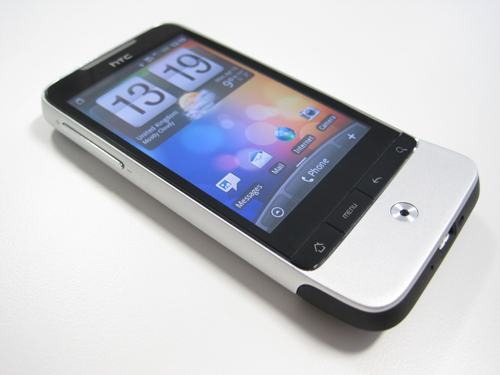
HTC and Android go way back. The first phone to sport Google’s mobile operating system was produced by HTC, and ever since then the company has been at the forefront of hardware development in the Android field, releasing such leading lights as the Hero and Nexus One.
Taking this into account, it’s hardly surprising that many Android users view HTC as the company best positioned to push the OS into Apple-like realms of popularity, and the launch of the simply gorgeous HTC Legend – along with its more powerful (but arguably less attractive) sibling the HTC Desire – has prompted many to conclude that the iPhone’s days are well and truly numbered.
Hold your body close to mineThe very first time you hold this astonishingly beautiful device in your hand it’s hard to disagree with that sentiment: fashioned from one solid slab of aluminium, the Legend is without a shadow of a doubt one of the most visually alluring phones we’ve ever laid eyes on.
The unibody construction also results in a pleasingly robust feel. There’s none of the creakiness one usually finds in mobile phone handsets. Access to the battery, SIM card, and micro SD card is obtainable by opening the small plastic hatch at the bottom of the phone, which also serves as a handy “bumper”, preventing unwanted knocks and bashes.
While the Legend blows away its stablemates the Nexus One and Desire in terms of physical attractiveness, the 3.2-inch screen isn’t quite as impressive. Having said that, it uses AMOLED technology which means it’s still better than 90 per cent of the competition out there right now, demonstrating how far ahead HTC is in this regard.
Sense and sensibilityHTC’s propriety Sense user interface is unquestionably the best custom variant of Android currently available: the firm’s knack for creating desirable handsets has clearly crossed over to the software side of things as well. Sense looks fantastic and is packed with slick presentation, neat animation, and near-essential functionality.
The version installed on the Legend is based on the updated Android 2.1 framework, which was first revealed on the Nexus One at the start of the year. This means you’ll be able to download all of the latest apps – including the 2.1 exclusive Google Earth – and should ensure you gain access to all of Android’s best features, for the time being at least.
Of course, with Sense being a custom-developed interface the Legend might get left behind as Google pushes out other incremental updates. The fortunes of the HTC Hero – which, at the time of writing remains lumbered with Android version 1.5 – give some indication of just how risky running a proprietary OS can be.
Putting aside issues of fragmentation for just one moment, there’s little doubt that Sense is one of the best – if not the best – mobile phone operating system currently available. Of the new features introduced in this variant we especially like the innovative new Friends Feed widget, which combines data from your Facebook, Twitter, and Flickr accounts to create a one-stop guide to your social networking life.
The pinch zoom home screen overview is also a nice touch, taking a cue from Apple’s “Expose” function, present in its home computer OS. This allows you to quickly jump to one of the seven home screens rather than having to tiresomely flick through them.
My weakness is none of your businessWith such a comprehensive array of killer features it’s hard to pick fault with the Legend, but there are some weaknesses present. The CPU runs at 600 MHz – as opposed to the 1 GHz Snapdragon processor beating inside the Nexus One and the Desire – which means that some apps run a little slower on this phone.
Also, the Legend suffers from the same touchscreen issues that afflicted the Nexus One: the capacitive screen is capable of registering two touches at once but gets easily confused, which means complex games aren’t likely to be an option.
You might ask yourself why the Legend could ever be a viable proposition when the Desire and Nexus One are both available and boast more powerful internals and bigger screens, but the fact is that this device looks and feels much better than its HTC brethren and the difference in speed is actually less apparent than you might otherwise think.
Ultimately, the Legend is supposed to replace the Hero as HTC’s mid-range Android handset, and in that regard it's a complete success. This is the product of a company which is truly hitting its stride, so let’s hope Apple’s recent legal sabre-rattling doesn’t impinge on future ventures.
HTC Legend

